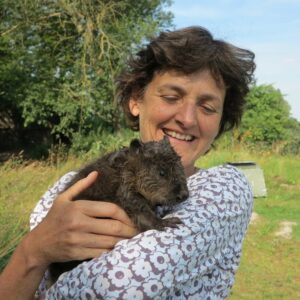Reintroductions
Apart from the restoration of natural water systems and managing our grazing animals, Knepp is essentially about letting go - allowing nature to take over.
It’s about sitting on your hands, with no expectations, and seeing what turns up. And the arrivals are often surprising. No one could have predicted at the outset of the project, for example, that we would become one of the most important sites in Britain for turtle doves and nightingales. Or that we would have ravens, peregrine falcons, and Bechstein’s and barbastelle bats here within just a few years.
It is often tempting to consider Knepp as a site for reintroductions. The kind of habitat emerging here is now so rare in the rest of Britain, and there are so many species under threat or even extinct, that we often receive appeals from ecologists with suggestions of species in need of a helping hand. Knepp could be prime habitat for, say, corncrakes, cranes, osprey, hedgehogs, and red-backed shrike, even native plant species.
But the real value of Knepp, we feel, is to wait and see what turns up of its own accord. Nature, we are learning, is often far more resilient than we give it credit for. Hedgehogs disappeared in our last decade of intensive farming but recently seem to be making a comeback on their own. Ospreys have not bred here yet, but are occasional visitors. Rare beetles are on the increase and Water-violets have already begun to spread through our watercourses. We believe it will only be a matter of time before we see our first greater horseshoe bat here, flying in from territory not far away in Midhurst.
Being patient, and giving nature the benefit of the doubt, can reap huge rewards. It can show what can return, given the right conditions, without the need for hugely expensive and time-consuming human interventions.
There are, however, some notable exceptions. Beavers, once native to Britain and extinct since the 18th century, are now living free again in Scotland – where they are a protected species – and, in England, beavers have been granted license to roam the River Otter in Devon. We’ve been campaigning for greater appreciation of this keystone species for many years and hope that it won’t be long before we see free-living beavers throughout the UK. For, now, though, Natural England has granted over a dozen licenses for beavers at trial sites to be released within enclosures. Knepp is one of those sites and we look forward to seeing how this extraordinary ecosystem engineer makes its mark on our landscape with, we hope, a significant effect on biodiversity and water management.

Issy with a rescued beaver kit in Bavaria.
Bison were originally on our Letter of Intent to Natural England as a species we would love to have at Knepp. Another keystone species, they’ve been reintroduced with huge success in conservation projects in Europe. Despite a fearsome reputation they actually pose no threat to humans, and early trials in Holland show they can even grow safely accustomed to walkers with dogs. The first bison to be introduced to the UK are at the Wilder Blean project run by Kent Wildlife Trust and we hope this will encourage further reintroductions elsewhere in the UK in the near future.
The white stork, which dates back to the Middle Ages in Britain, is another species undergoing successful reintroductions in Europe – notably in Sweden, Poland, France, the Netherlands, Belgium, Switzerland and, since 2016, here in Sussex. White storks are usually faithful to their natal site and depend on an established colony for successful breeding, so these reintroduction programmes use captive birds to seed initial colonies in order to restore these charismatic birds to their former breeding range. DEFRA considers this strategy in Britain to be a ‘reinforcement’ of the 20 or so birds that currently fly over to the UK from the continent every year. Knepp, in partnership with the Roy Dennis Wildlife Foundation, Warsaw Zoo, Cotswold Wildlife Park and a number of private landowners in the southeast, has embarked on an exciting project to re-establish a breeding population of these charismatic birds. Sussex was once a stronghold for white storks and we’ve been thrilled to see them building their great nests at Knepp in big old oaks and bill-clattering on roof-tops once again.
The red-backed shrike is also a possible contender for reintroduction to Knepp and the wider landscape. Common in the UK in Victorian times its dramatic decline to virtual extinction since then make this a targeted species for Natural England. Knepp’s high quality scrubland is perfect habitat for red-backed shrikes but a lack of both continental immigrants and domestic recruits displaying site fidelity means natural recolonisation is unlikely. A feasibility study, in partnership with RSPB and Natural England, is currently underway to look at the practicalities of bringing this migratory bird back to Knepp and the local landscape.